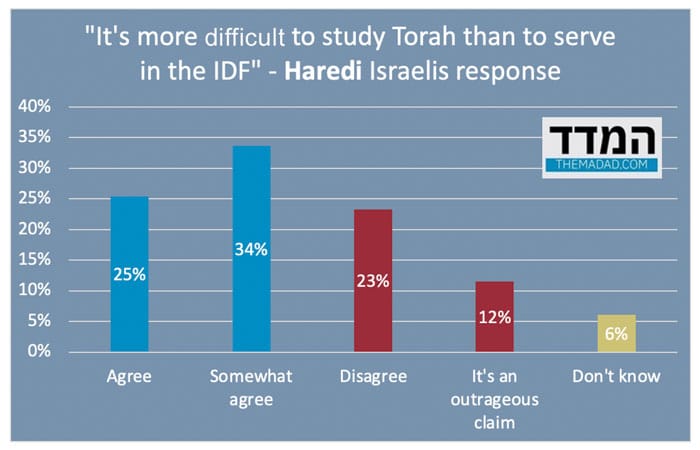 vadimrysev/Getty Images
vadimrysev/Getty Images The agenda for the winter session of Israel’s Knesset can be described in all kinds of ways, all connected to the ultra-Orthodox.
One way: Passing a law that would exempt the ultra-Orthodox from army conscription for good. Another: Passing a law that will allow for more integration of ultra-Orthodox Israelis in the labor market. Another: A move that would finally end a crisis that has no solution. And finally: A move that will mark the beginning of the end of Israel’s “People’s Army.”
The last option — the fourth — is the most dramatic. And it is also the least talked about. Many Israelis believe that all Israelis must share the burden of military service. Many of them are angry at any plan that would exempt the ultra-Orthodox forever. Many are also worried because half of all ultra-Orthodox men don’t work. Some of them believe that it is more important for Israel that the ultra-Orthodox work than that they enlist. And we are all tired of the never-ending debate about drafting the ultra-Orthodox. They tell us in surveys that “they won’t enlist anyway,” so maybe it’s time to end this charade once and for all — let’s pass a new law and move on.
Few Israelis — too few — take the fourth option into account. But it’s a possibility that some experts believe is a certainty. The law that the government is slated to pass in October would be a watershed, beyond which the IDF will no longer be what it was. It will no longer be a “People’s Army.” Not in principle (because there is a law that exempts Israelis from conscription), and not in fact (because other Israelis will decide that if there is an exemption, they too deserve it).
The “People’s Army” brand has a practical function: it allows the IDF to recruit everyone, including the best and the brightest, to fill the ranks of the regulars and the reserves, to give Israelis a feeling of binding partnership. But the “People’s Army” brand also has a symbolic role: It is an essential part of Israel’s identity, a core feature of its character.
If Israel loses the IDF as a People’s Army, this will have practical and symbolic consequences. Security experts will have to deal with the practical consequences. What new model to adopt, how to maintain Israel’s security in a new era. Some of them say that there is no such possibility. This is a scary statement, but it is not necessarily relevant: if the IDF must change, they’d still have to sit down and devise a way to keep us all secure. They will have to square the circle, or whatever cliché you choose, and make Israel strong enough with an IDF that is no longer the “People’s Army.”
It is very difficult to imagine the State of Israel without the IDF as a central, dominant, unifying symbol.
Alongside this practical challenge, there is also a symbolic challenge. It is very difficult to imagine the State of Israel without the IDF as a central, dominant, unifying symbol. It is very difficult to imagine Israel without the ethos of the People’s Army. But you can try to do it, by looking at the many countries where there is no “People’s Army.” These are countries where the army is sometimes revered and sometimes less so, these are countries where a large part of the population are alienated from the military, do not know much about it, do not understand it. In those countries, the military is still and institution with an important role, like the Ministry of the Interior, or the Parks Authority, or the police.
In fact, the police is a good example with which to imagine Israel of the future. If the IDF is no longer the people’s army, it will be more like the police. That is, an institution that we all understand is important, and that we are all grateful to those who work in it, but it is not a unique Israeli symbol. No one says about the policemen that they are “our children.” We only say such thing about the soldiers. In polls that test approval and trust, the IDF is always at the top. The police is not.
So ahead of the winter session of the Knesset, one should take into account the possibility that this is exactly the move the government is leading to. And of course, its ministers will say no, that’s not true, what you say is unthinkable. And yet, there’s no other way to interpret a blanket exemption for a rapidly growing population. It might possible to have a military based on 80% of the population and still call it a “People’s Army,” and maybe 70%, or even 60%. But at a certain point – 50%? 40%? – the house of cards will collapse. There is no “People’s Army” when so many Israelis are exempt from it both practically and in principle.
An IDF that is not the “People’s Army” will be a completely different institution.
An Israel whose military is not a people’s army will be a completely different Israel.
Something I wrote in Hebrew
Connect the dots and discover a pattern. The government has a pattern. It has a unique character. Our current government is the We-Know-Better government. By accepting this theme as the defining theme of the government, suddenly everything seems clear. Finance Minnister Bezalel Smotrich thinks he knows better than the Shin Bet what will or will not cause the radicalization of Arab students. Justice Minister Yariv Levin thinks that politicians know better than judges how to handle citizens rights. MK Simcha Rothman believes that he is the outmost expert on constitutional law. MK Moshe Gafni knows better than the Bank of Israel how to manage the interest rate. Minister Itamar Ben-Gvir knows better than the police how to tame crime violence … This is a fascinating phenomenon, which mixes arrogance (we won the elections, a sign that we are smarter), with feelings of inferiority (so we don’t know math or English, so what?).
A week’s numbers
This is one reason why Haredi Israelis can’t quite communicate with their secular fellow citizens.

A reader’s response:
Rafi Schweig asks: “Would most Israelis still prefer Trump over Biden in the next election?” My response: The understanding between the U.S. and Iran from last week makes this quite likely.
Shmuel Rosner is senior political editor. For more analysis of Israeli and international politics, visit Rosner’s Domain at jewishjournal.com/rosnersdomain.























 More news and opinions than at a Shabbat dinner, right in your inbox.
More news and opinions than at a Shabbat dinner, right in your inbox.